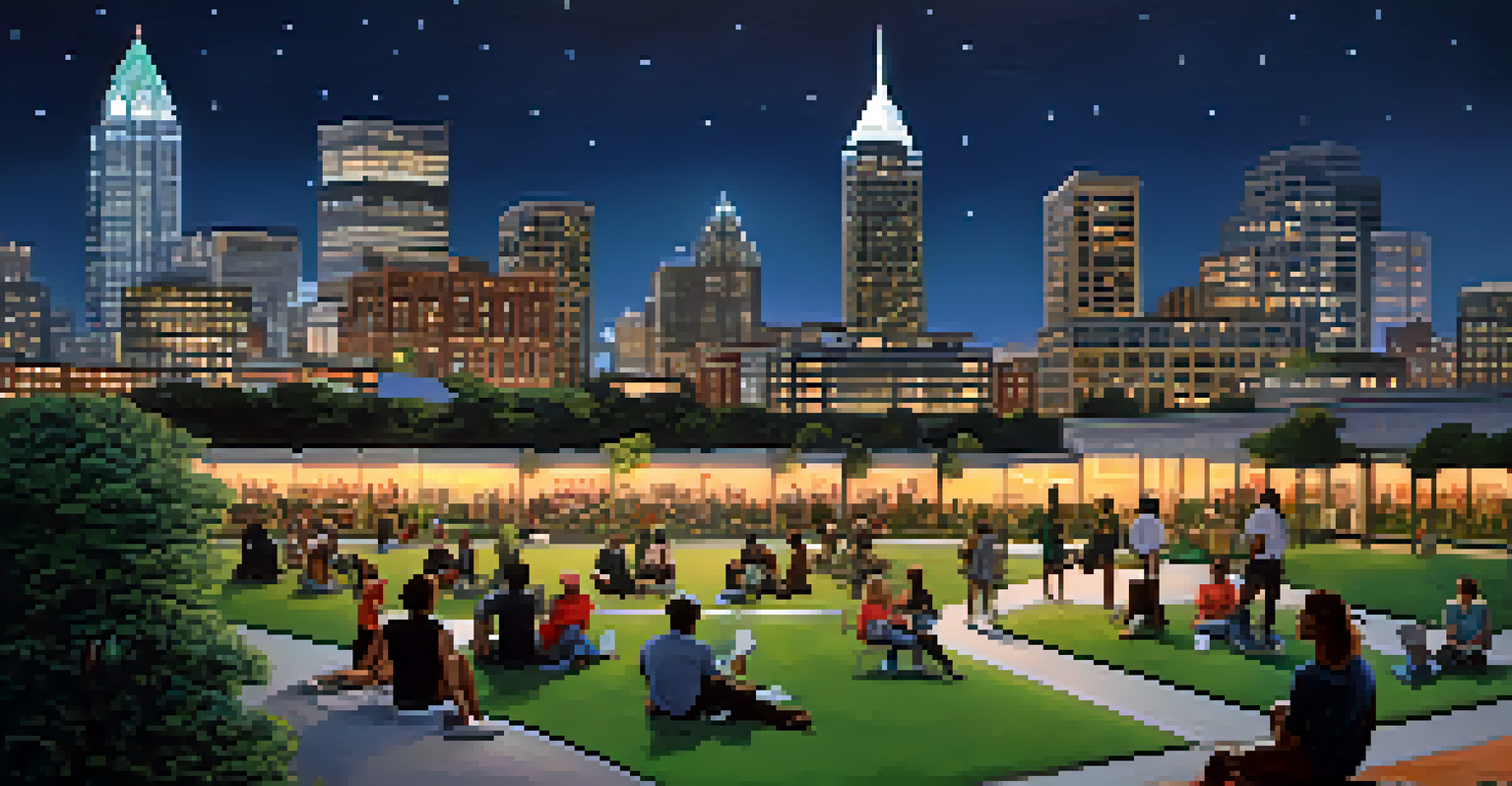Exploring the Literary Contributions of Atlanta's Authors

The Birth of Southern Literature in Atlanta
Atlanta has long been a cradle for Southern literature, serving as a backdrop for many iconic works. The city's unique blend of history and culture has inspired writers to explore themes of identity, race, and resilience. Early authors like Joel Chandler Harris, known for his Uncle Remus tales, captured the essence of Southern folklore, showcasing the region's rich oral traditions.
Literature is a way of seeing the world; it allows us to reflect on our lives and understand our place in society.
As the Civil War and Reconstruction shaped Atlanta, authors began to delve into social and political issues through their works. Writers like Margaret Mitchell, with her Pulitzer Prize-winning novel 'Gone with the Wind,' portrayed the complexities of Southern life during tumultuous times. This period marked a significant evolution in the literary landscape, with Atlanta at its heart.
Today, the legacy of these early writers continues to influence contemporary authors, who draw upon the city's rich history. Atlanta remains a pivotal point for Southern literature, inspiring new generations to tell their stories, shaped by the very fabric of the city.
Highlighting Atlanta's Diverse Voices
Atlanta is a melting pot of cultures, and this diversity is beautifully reflected in its literary scene. Authors like Alice Walker and Tayari Jones have made significant contributions, exploring themes of race, gender, and social justice. Their works resonate not only within the Southern context but also on a global scale, fostering empathy and understanding.

Moreover, the rise of the contemporary literary movement in Atlanta showcases the city as a hub for new voices. Emerging writers from various backgrounds bring fresh perspectives, enriching the literary tapestry. This inclusivity is vital, as it encourages dialogue and reflects the realities of modern society.
Atlanta: Cradle of Southern Literature
Atlanta has been a crucial hub for Southern literature, shaping narratives around identity, race, and resilience.
By celebrating diverse authors, Atlanta reinforces the importance of representation in literature. The stories told by these writers challenge stereotypes and expand the understanding of the Southern experience, making their contributions invaluable to the literary world.
Atlanta's Role in the Civil Rights Movement
The literary contributions of Atlanta's authors are deeply intertwined with the civil rights movement. Writers like James Baldwin and Maya Angelou used their platforms to address racial inequality, bringing attention to the struggles faced by African Americans. Their powerful narratives not only documented the era but also inspired activism and change.
If you don't understand how the world works, you can't change it.
Atlanta itself was a pivotal location for many civil rights actions, and this historical significance is echoed in the works of local authors. For instance, John Lewis, a key figure in the movement, authored graphic novels that educated younger generations about the fight for equality. These literary works serve as vital records of history and sources of inspiration.
The legacy of these authors lives on today, as their stories continue to educate and empower. By examining the intersection of literature and civil rights, we gain a deeper understanding of the societal challenges that persist and the power of words in advocating for justice.
The Influence of Atlanta's Literary Festivals
Atlanta hosts several prominent literary festivals, which play a significant role in promoting local authors and their works. Events like the AJC Decatur Book Festival attract thousands of literature enthusiasts, providing a platform for writers to connect with readers. These festivals celebrate the written word while nurturing a vibrant literary community.
In addition to showcasing established authors, these festivals often highlight emerging talent, creating opportunities for new voices to be heard. Workshops and panel discussions allow writers to hone their craft while engaging in meaningful conversations about literature and society. This fosters an environment of collaboration and growth.
Diverse Voices Enrich Literary Scene
The city's literary community thrives on diversity, with authors exploring themes of race, gender, and social justice.
By participating in these events, Atlanta's authors contribute to a culture of literary appreciation that resonates beyond the city. The festivals not only enrich the local arts scene but also position Atlanta as an essential destination for literary exploration.
The Impact of Atlanta on Genre Fiction
Atlanta's vibrant literary scene has significantly impacted the realm of genre fiction, particularly in the realms of mystery, science fiction, and fantasy. Writers like Patricia Cornwell and her Kay Scarpetta series have put Atlanta on the map for crime fiction enthusiasts, weaving the city's landscape into thrilling narratives. This not only highlights local settings but also engages readers with relatable, authentic environments.
Additionally, authors such as Nichelle Nichols have contributed to the science fiction genre, inspiring readers to imagine worlds beyond their own. Their works often explore themes of identity and belonging, reflecting the complexities of life in Atlanta. By doing so, they invite readers to embark on journeys that challenge conventional narratives.
The growth of genre fiction in Atlanta showcases the city's literary versatility, attracting a wide range of readers and writers. As these genres continue to flourish, Atlanta solidifies its status as a vital player in the broader literary landscape, encouraging creativity and innovation.
Celebrating the Legacy of Atlanta's Poets
Poetry has a rich tradition in Atlanta, with poets like Gwendolyn Brooks and Kevin Young making significant contributions to the art form. Their works often reflect the city's diverse culture and the complexities of the human experience, resonating with readers on a deeply emotional level. Atlanta's poetic voice continues to evolve, encompassing a range of styles and themes.
Additionally, local initiatives and open mic events have nurtured a vibrant poetry community, allowing voices from all walks of life to be heard. This inclusivity fosters creativity and encourages emerging poets to share their work, building a supportive network. The city's poetry scene thrives on collaboration, enriching the literary fabric of Atlanta.
Literature's Role in Civil Rights
Atlanta's authors have played a significant role in the civil rights movement, using their writing to inspire change and document struggles.
As we celebrate the legacy of Atlanta's poets, we recognize the power of poetry in capturing the essence of the human experience. Their words offer insight, provoke thought, and inspire connections, making poetry an essential part of Atlanta's literary landscape.
The Future of Atlanta's Literary Scene
Looking ahead, the future of Atlanta's literary scene is bright, with a growing emphasis on innovation and inclusivity. New platforms, such as online publishing and social media, allow authors to reach wider audiences and experiment with their craft. This evolution encourages a diverse array of voices to emerge, expanding the literary conversation.
Furthermore, educational institutions in Atlanta play a pivotal role in shaping the next generation of writers. Programs that promote creative writing and literary studies foster talent and encourage students to explore their unique perspectives. This investment in education ensures that Atlanta's literary legacy will continue to thrive.

As the city embraces change and nurtures creativity, we can expect to see an exciting array of literary works that reflect the complexities of contemporary life. Atlanta's authors will undoubtedly continue to inspire, challenge, and engage readers for years to come.